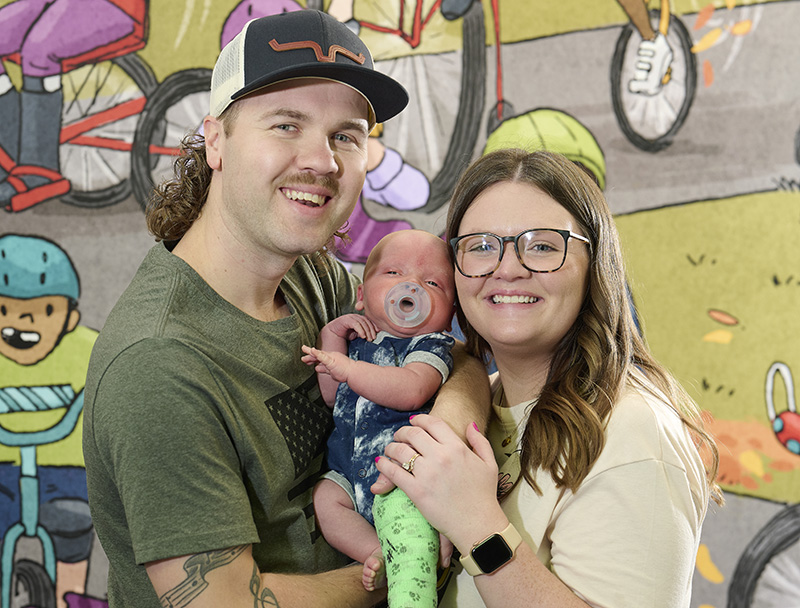Surgery at the Fetal Care Center Offers Hope for Baby With Spina Bifida
When Paige’s water broke at 37 weeks pregnant, she was ready to meet her baby. It was a markedly different feeling from earlier in her pregnancy, when, at 25 weeks gestation, Paige underwent a surgery at Barnes-Jewish Hospital to repair a defect in her baby’s spine. With tears in her eyes, Paige was wheeled back to the operating room, hoping that doctors wouldn’t have to deliver her baby early because of the procedure.
Just a month earlier, when Paige and her husband, Cody, went for her 20-week ultrasound, they noted that the tech was quiet during the scan. The couple, who lives in the Kansas City area, didn’t think much of it, but later Paige’s doctor followed up with some life-changing news: The ultrasound revealed that their baby had a neural tube defect.
Paige and Cody’s baby would be born with spina bifida, specifically myelomeningocele (MMC), a condition that occurs when the fetus’ spinal cord doesn’t develop properly and a portion of the cord and nerves protrude from an opening in the baby’s back. Babies with MMC can have severe disabilities, including altered brain development, decreased ability to move lower extremities, difficulty walking, challenges with urination, and hydrocephalus, or a buildup of fluid in the brain, “We had no idea what we were up against,” Paige remembers.
Arriving at a decision
Paige’s doctor referred her to The Fetal Care Center to discuss her care options. The Center draws on the expertise of three world-class medical institutions: Barnes-Jewish Hospital, St. Louis Children’s Hospital, and WashU Medicine physicians.
One option for surgery is known as the open technique, performed between 24 and 26 weeks gestation. Doctors make two large incisions, one in the pregnant patient’s abdomen and one in her uterus, to access the fetus’ back. They then place the protruding sac containing the fetus’ spinal cord and nerves back in the spinal canal and seal the baby’s tissue over the opening.
Because the pregnant patient’s belly will continue to grow after surgery, there is a risk of uterine rupture. After surgery, mothers need to limit activity and stay on bed rest near the hospital for the remainder of their pregnancy. For moms like Paige, who don’t live near a hospital that can perform the procedure, this can be a burden. Paige’s baby, and any future babies, would also need to be delivered by cesarean section.
But doctors at The Fetal Care Center determined that Paige was a good candidate for a less invasive version of the surgery, called a fetoscopic MMC repair. Fetoscopic surgery requires three smaller incisions instead of a larger one in the uterus, and the risk of uterine rupture decreases to nearly zero. After surgery, patients can resume activity and travel home to deliver their baby at a hospital with a newborn intensive care unit and may also be able to deliver vaginally.
“What we've seen from parents and what we've seen across the country is that there is this increasing need and want for more flexibility after the fetal surgery so that that mom does not have to stay on bedrest for the duration of pregnancy,” says Jennifer Strahle, MD, a WashU Medicine fetal and pediatric neurosurgeon at The Fetal Care Center.
The Center is one of the few in the United States, and the only one in the St. Louis region, that offers this surgery—but if Paige decided to go this route, she would be the first patient to undergo the procedure at The Fetal Care Center.
She would also have to decide quickly. The surgery must be performed before 26 weeks gestational age.
A rewarding first surgery
Faced with the option of fetoscopic surgery, Paige sought advice from those around her.
 “I just trust these doctors so much,” Paige says. “I feel like they're excited, and they want this to go well. I feel like they took really good care of us because they wanted to be successful, too.”
“I just trust these doctors so much,” Paige says. “I feel like they're excited, and they want this to go well. I feel like they took really good care of us because they wanted to be successful, too.”
Paige’s care team at The Fetal Care Center included Dr. Strahle, Jesse Vrecenak, MD, a WashU Medicine fetal and pediatric general surgeon and the Center’s surgical director, and Katherine Bligard, MD, a WashU Medicine maternal-fetal medicine specialist and associate director at the Center. They worked for years to be able to offer the surgery, becoming comfortable with multiple simulations and working together as a team to ensure the best outcome. And in Paige’s case, that’s exactly what happened. After waking up from surgery, foggy from the anesthesia and magnesium to dull her pain and prevent her from going into early labor, Paige learned that the procedure was a success. Her baby was fine.
“It was great to see the surgery go as well as it possibly could have gone,” Dr. Bligard says. “Everything was seamless.”
 Dr. Bligard checked in on Paige over the next few weeks of her recovery before she was discharged and returned to Kansas City. On July 5, 2023, Paige and Cody gave birth to their son, Wesley. Although Wesley is receiving follow-up care closer to his Kansas City home, the family has returned to St. Louis to visit the Center’s providers, with Wesley in tow.
Dr. Bligard checked in on Paige over the next few weeks of her recovery before she was discharged and returned to Kansas City. On July 5, 2023, Paige and Cody gave birth to their son, Wesley. Although Wesley is receiving follow-up care closer to his Kansas City home, the family has returned to St. Louis to visit the Center’s providers, with Wesley in tow.
“Getting to see [the baby] come back, to see his scar from his surgery, and to see how well he’s doing with moving his legs, is rewarding,” Dr. Bligard says.
Today, Wesley, who is now 2 years old, is doing well. According to Paige, he’s walking, talking, and climbing, all things he might not have ever been able to do without the surgery. He loves to be outside, has hit all his developmental milestones, and with Paige and Cody expecting their second child, he’s now preparing for his role as a big brother.
Paige is thankful and happy that Wesley is growing and living childhood as she always hoped he would.
“You're so worried about all these things because you know he has a disability, but now he’s here and he’s a normal baby,” Paige says. “We will do what we need to do, and we want to do everything we can to make his life the best that it can be.”
Learn more about The Fetal Care Center at Barnes-Jewish Hospital and St. Louis Children’s Hospital.
Recent News
Patient Story
Chenitra Emergency Care
Patient Story
Christian Hospital Hybrid Room Procedures Save Lives
Patient Story
Finding Expert Wound Care Close to Home
Patient Story
Seeing the Glass Half-Full Amidst Life-Changing Colon Cancer Diagnosis
Patient Story
From Emergency to Empowerment: John Cline’s Stroke Story
Patient Story